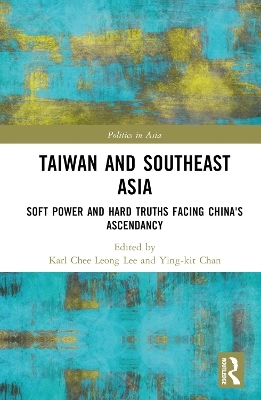
Taiwan and Southeast Asia
Routledge (Verlag)
978-1-032-34080-7 (ISBN)
Lee, Chan and their contributors analyse the different kinds of soft power deployed by Taiwan in its bid to strengthen its relations with its neighbours in Southeast Asia.
Despite not having formal diplomatic relations with Southeast Asian countries after their diplomatic recognition of the People’s Republic of China decades ago, Taiwan continues to be a key economic and socio-cultural partner for the region at large. Successive administrations in Taiwan from the Chen to Tsai eras have circumvented the long-standing absence of diplomatic recognition with the diffusion of soft power ─ shaping what others want with attractiveness ─ through the utilization of its existing economic and socio-cultural links with Southeast Asian countries. While such soft power diffusion contributes to Taiwan’s triple quests for legitimacy as a member of international community, status as a constructive actor in the region and long-term economic prosperity for the island-state, the emergence of China as an economic superpower in the 21st century has significantly challenged such quests from Taipei. The contributors to this volume examine both the intentions and the reception of Taiwan’s approach to the nations of ASEAN.
An essential read for students and researchers investigating the impact and limitations of soft power in foreign policy.
Karl Chee Leong Lee is Senior Lecturer at the Institute of China Studies at the University of Malaya, Malaysia. Ying-kit Chan is an Assistant Professor at the Department of Chinese Studies, National University of Singapore.
1. Introduction: Taiwan’s International Ostracization and Soft Power
Karl Chee Leong Lee
2. Taiwan and Southeast Asia: From the Republic of China to the Taiwan Generation
Samuel C.Y. Ku
3. Shifting the Foundation of Taiwan-Cambodia Relations: Potential Effects of Taiwan’s NSP
Wen-Pin Lin
4. Cambodia-Taiwan Relations: Of Survival and Soft Power
Bradley J Murg and Sok Udom Deth
5. Taiwan’s Soft Power in Indonesia: Assessing the Education Aspects
Tonny Dian Effendi
6. The Current Developments and Achievements of Taiwan’s Humanistic Soft Power on Indonesian Migrant Workers
Ali Maksum
7. Taiwan’s Soft Power in Laos: The Duality of Overseas Chinese Bamboo Network and Private Sector-Driven Initiatives
Tai Wei Lim
8. Reconfiguring Taiwan’s Soft Power in Malaysia: "Blue Ocean" Collaborations under the New Southbound Policy (NSP)
Karl Chee Leong Lee
9. Will Taiwan’s Hard-Earned Relationship with Myanmar Change in the Post-Coup Era?
Kristina Kironska
10. Taiwan’s Official Development Assistance (ODA) as Soft Power Instrument in the Philippines
Jan Vincent Galas
11. Navigating the China Factor in Taiwan’s Soft Power Diffusion in the Philippines
Reymund B. Flores
12. Taiwanese Popular Culture and the Prospects of Taiwan’s Soft Power in Singapore-Taiwan Relations
Brenda Chan
13. Taiwan’s Soft Power in the Perceptions of the Thai Elites: From the Cold War to COVID-19
Sitthiphon Kruarattikan
14. Age of Disruption and Taiwan’s Soft Power in Thailand: The Milk Tea Alliance
Suwannarat Meesomboonpoonsuk
15. Taiwan’s Soft Power in Vietnam: Past, Present, and Future
Huynh Tam Sang
16. Unpacking Taiwan-Vietnam Relations: Empirical Study of Taiwan’s Image in Vietnam
Alan H. Yang
17. Conclusion: Taiwan’s Hardening Soft Power
Ying-kit Chan
| Erscheinungsdatum | 11.07.2023 |
|---|---|
| Reihe/Serie | Politics in Asia |
| Zusatzinfo | 14 Tables, black and white; 8 Line drawings, black and white; 6 Halftones, black and white; 14 Illustrations, black and white |
| Verlagsort | London |
| Sprache | englisch |
| Maße | 156 x 234 mm |
| Gewicht | 600 g |
| Themenwelt | Geisteswissenschaften ► Geschichte |
| Sozialwissenschaften ► Politik / Verwaltung ► Europäische / Internationale Politik | |
| Sozialwissenschaften ► Soziologie ► Spezielle Soziologien | |
| ISBN-10 | 1-032-34080-0 / 1032340800 |
| ISBN-13 | 978-1-032-34080-7 / 9781032340807 |
| Zustand | Neuware |
| Informationen gemäß Produktsicherheitsverordnung (GPSR) | |
| Haben Sie eine Frage zum Produkt? |
aus dem Bereich


